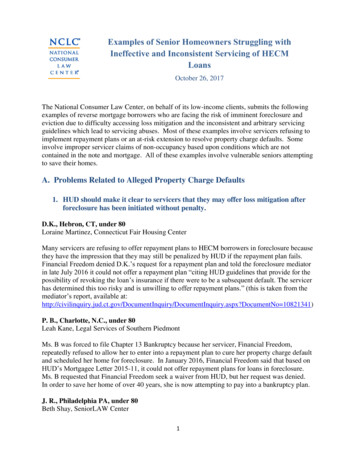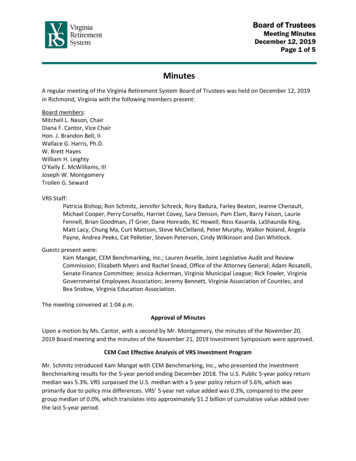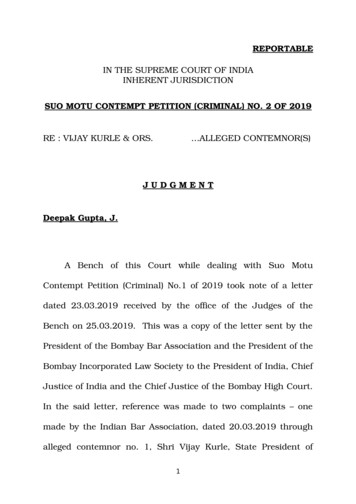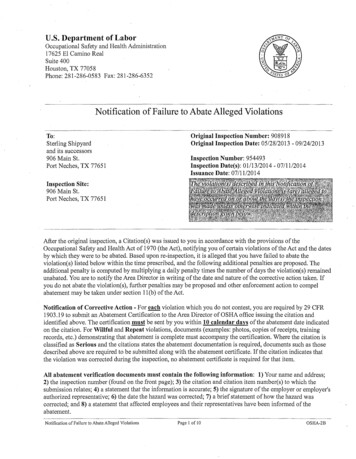
Transcription
Examples of Senior Homeowners Struggling withIneffective and Inconsistent Servicing of HECMLoansOctober 26, 2017The National Consumer Law Center, on behalf of its low-income clients, submits the followingexamples of reverse mortgage borrowers who are facing the risk of imminent foreclosure andeviction due to difficulty accessing loss mitigation and the inconsistent and arbitrary servicingguidelines which lead to servicing abuses. Most of these examples involve servicers refusing toimplement repayment plans or an at-risk extension to resolve property charge defaults. Someinvolve improper servicer claims of non-occupancy based upon conditions which are notcontained in the note and mortgage. All of these examples involve vulnerable seniors attemptingto save their homes.A. Problems Related to Alleged Property Charge Defaults1. HUD should make it clear to servicers that they may offer loss mitigation afterforeclosure has been initiated without penalty.D.K., Hebron, CT, under 80Loraine Martinez, Connecticut Fair Housing CenterMany servicers are refusing to offer repayment plans to HECM borrowers in foreclosure becausethey have the impression that they may still be penalized by HUD if the repayment plan fails.Financial Freedom denied D.K.’s request for a repayment plan and told the foreclosure mediatorin late July 2016 it could not offer a repayment plan “citing HUD guidelines that provide for thepossibility of revoking the loan’s insurance if there were to be a subsequent default. The servicerhas determined this too risky and is unwilling to offer repayment plans.” (this is taken from themediator’s report, available DocumentInquiry.aspx?DocumentNo 10821341)P. B., Charlotte, N.C., under 80Leah Kane, Legal Services of Southern PiedmontMs. B was forced to file Chapter 13 Bankruptcy because her servicer, Financial Freedom,repeatedly refused to allow her to enter into a repayment plan to cure her property charge defaultand scheduled her home for foreclosure. In January 2016, Financial Freedom said that based onHUD’s Mortgagee Letter 2015-11, it could not offer repayment plans for loans in foreclosure.Ms. B requested that Financial Freedom seek a waiver from HUD, but her request was denied.In order to save her home of over 40 years, she is now attempting to pay into a bankruptcy plan.J. R., Philadelphia PA, under 80Beth Shay, SeniorLAW Center1
Ms. R. came to us for assistance facing foreclosure due a property charge delinquency of 2,551.CIT Bank/Financial Freedom said they were not allowed to offer a repayment plan because theloan was in foreclosure. The Court instructed SeniorLAW Center to reach out to HUD and findout if a repayment plan was possible. HUD responded to our inquiry that HUD does not prohibita servicer from offering loss mitigation as defined in mortgagee letters 2015-11 and 2016-07 toHECM borrowers where the loan is in foreclosure. However, HUD does not require that theservicer do so. HUD emphasized that the permissive loss mitigation options offered inmortgagee letters 2015-11 and 2016-07 are solely at the discretion of the servicer.Once the Court understood that a plan was possible, the judge leaned on Financial Freedom, andwith further negotiation we might have been able to get them to approve a repaymentplan. However, this elderly homeowner actually fainted in the courtroom due to the anxiety andstress of this situation. This prompted her family to go to great lengths to come up with the fundsto bring the property charges current, to save her the stress of facing the risk of loss of herhome.A. G., Middletown, CT, under 80Loraine Martinez, Connecticut Fair Housing CenterIt is critical that HUD clarify to servicers that they are permitted to offer repayment plans afterforeclosure has been initiated. Among other reasons, servicers sometimes wrongfully initiateforeclosure while a borrower is performing on an existing repayment plan. A.G. was performingon a repayment plan when RMS sent a notice of default and referred his loan to foreclosure. Inits response to a Notice of Error, RMS stated that it cannot offer A.G. a repayment plan becausehis loan is in “active foreclosure.”D. M., Torrington, CT, Age 72Sarah White, Connecticut Fair Housing CenterD. M. is another example of the problem of servicers initiating foreclosure wrongfully, and thentaking the position that they cannot offer a repayment plan once foreclosure has been initiated.D.M. was performing on a repayment plan when Financial Freedom sent a notice of default andreferred her loan to foreclosure. Financial Freedom’s counsel told the mediator it cannot reviewher for a new repayment plan because she is in foreclosure. D.M.’s home has been in her familyfor more than 100 years, and she raised her 8 children there. She was confused about herobligation to pay taxes and thought she could pay on a monthly basis to the lender, like escrow,which Financial Freedom had allowed her to do for several years without explaining otherwise.B.Y., Bridgeport, CT, under 80Sarah White, Connecticut Fair Housing CenterFinancial Freedom told B.Y.’s housing counselor in late August 2016 that it cannot offerrepayment plans to borrowers in foreclosure. It appears that Financial Freedom has made abusiness decision not to offer repayment plans to any borrowers in foreclosure. This policy will2
result in a substantial number of vulnerable seniors facing foreclosure and eviction who couldafford a repayment plan.V.P., Seymour, CT, under 80Pamela Heller, Connecticut Fair Housing CenterV.P. was making payments to Financial Freedom under an oral repayment plan when they quitaccepting them and placed her in foreclosure. Financial Freedom told the mediator inSeptember 2016 that it “does not elect to offer repayment plans pursuant to permissive lossmitigation as outlined in Mortgagee Letter 2016-07,” the Mortgagee Letter that made it clearrepayment plans may be offered after foreclosure has been initiated. (See Mediation iry/DocumentInquiry.aspx?DocumentNo 11092326)J. S., Philadelphia, PA, 66 years oldKimm Tynan, Philadelphia Legal AssistanceForeclosure counsel claims in mediation that Reverse Mortgage Solutions has made a businessdecision to not offer repayment agreements to reverse mortgage borrowers in foreclosure.According to RMS’s counsel, the reason for this policy is that, ML 2016-07 notwithstanding,they are “still” being penalized by HUD if they enter into a repayment agreement and theborrower subsequently defaults on the repayment agreement. He said that for HUD’s purposesthe case is considered to be in foreclosure for the life of the repayment agreement. He said thatHUD cannot penalize them if the borrower files a Chapter 13, and “a Chapter 13 is the same as a60-month repayment agreement,” so they have simply made a business decision that HECMborrowers in default should file Chapter 13 bankruptcy.This client had attempted to negotiate a repayment agreement with RMS well before theforeclosure complaint was filed, but they refused that too. Client was diagnosed with breastcancer in September 2015, and her default was caused in part by the cost of hermedications. She also had difficulty because a sinkhole in the street caused major plumbingdamage that she was responsible for repairing.2. Effective oversight is needed to deter aggressive and sloppy servicing practicessurrounding payment of property charges.L.B., Westport, CT, under 80Sarah White, Connecticut Fair Housing CenterMs. B has been put into foreclosure despite being current on a repayment plan to cure herproperty charge default. Ms. B is current on a repayment plan with Wells Fargo for floodinsurance and is current on ongoing taxes and insurance, yet Wells Fargo served her with asummons and complaint initiating a foreclosure. Wells Fargo’s customer service representativetold her to “ignore” the summons and complaint.3
Ms. R., New York, N.Y., Age 68Jennifer N. Levy, JASA Legal Services for the Elderly in QueensMs. R. is a 68-year old Queens Village resident who lives on Social Security and SupplementalNutrition Assistance Program (SNAP) benefits. She found herself in foreclosure withoutknowing why. Fortunately, she was able to seek the help of JASA-LSEQ to represent her in therequired foreclosure settlement conferences. In these conferences, the lawyers for UrbanFinancial (now called Finance of America Reverse LLC) and her reverse mortgage servicer,RMS, cited a different basis for the foreclosure each time they appeared, such as failure to makerepairs, failure to pay taxes, and even the death of the borrower. Ms. R’s attorney, who hadfigured out that her lender instituted the foreclosure because they believed she was dead, tried toclarify this to the court, but the court released her case from mediation because the lender’sattorney represented that Ms. R was behind on property taxes, and because at the relevant time,New York law excluded reverse mortgage foreclosures from the opportunity to negotiate aresolution in a settlement conference. The lender, through their attorneys at Fein, Such & Crane,repeatedly ignored requests for an updated breakdown of Ms. R’s default balance, refused toconsider Ms. R. for a repayment plan, and refused to permit JASA-LSEQ to talk to UrbanFinancial’s affiliate, Reverse Mortgage Solutions. Instead, Urban Financial proceeded with theforeclosure by filing a summary judgment motion, essentially stating that there are no disputedfacts. JASA/LSEQ successfully obtained an Order denying summary judgment based onplaintiff’s failure to comply with a condition precedent by failing to provide sufficient proof ofdefault notice to the borrower.O. L., Lakeland, Florida, Age 92Lynn Drysdale, Jacksonville Area Legal Aid, Inc.Client is very feeble and has a very difficult time getting around. She also has poor eyesight.Her servicer, Financial Freedom/CIT Bank, said she failed to maintain insurance for a shortperiod of time. The payment for the Force-Placed Insurance was initially noted as a loan balancetransfer that she did not need to repay. Then the servicer unilaterally decided they would seekpayment from her instead. She sent them a check but it was 30 cents short. They sent her a billfor the 30 cents, printed as .3. She read it as seeking 3 cents and sent them a check for thatamount. They foreclosed based upon the 27 cent delinquency. It is difficult to understand why aservicer would initiate foreclosure in this situation rather than working with the 92 year oldHECM borrower, who clearly could have sent an additional 27 cents.This was the second foreclosure filed against this elderly borrower in less than a year. The firstwas a non-occupancy case regarding her home of 40 years. They figured out their mistake whenher attorney explained she was living in the home, and voluntarily dismissed the first foreclosure.During the pendency of the second foreclosure, and while she was being represented by counsel,they threatened to file foreclosure number three for alleged non-occupancy.Ms. N., New York, N.Y., Age mid-80sRandi Scherman, Staten Island Legal Services4
Ms. N, a senior in her mid-80’s who takes home 3,500 a month from her job and benefits, tookout a reverse mortgage in 2007 on the home that she shared with her daughter and grandchildren.Her daughter handled the property charge payments and helped with the household expensesuntil she passed away in 2009. With her daughter gone, Ms. N became responsible for the care of3 grandchildren and 3 great-grandchildren, all of whom live with her. Due to the increasedexpenses and having lost the income contribution of her daughter, she fell behind on her taxesand insurance and was ultimately assisted by the New York State Mortgage Assistance Program(NYS-MAP), a highly-sought after and limited resource, to catch up on the property charges andavoid a foreclosure.After Ms. N received this help, Champion, her reverse mortgage lender, prematurely paid herproperty taxes for the next year two weeks before they were due. Not receiving any notices fromChampion, Ms. N never knew that she owed Champion any money until she was served with anew foreclosure complaint only two months after her former case was discontinued. Theforeclosure complaint did not list a payoff amount or the reason for the foreclosure, but insteadstated in boilerplate language that she may owe for insurance and/or taxes, with the full amountof her mortgage shown as the amount needed to save her home. Ms. N and her legal servicesattorney had to match her payment history with that of the municipality to come to theconclusion that Champion had paid her property taxes in advance. Champion had filed aforeclosure against Ms. N for a debt that she did not yet owe yet at the time, in the amount ofabout 600. Champion ultimately requested to discontinue the foreclosure action after Ms. N.asserted her defenses and paid the amount owed, but charged her 5,000 in attorney fees.Without the intervention of her attorney, Ms. N may have had to pay the attorney fees, courtcosts, and might have ultimately lost her home, all for 600 that wasn’t even due yet.Mr. S, Jacksonville, Florida Age 80Lynn Drysdale, Jacksonville Area Legal Aid, Inc.Mr. S had reached a repayment agreement with J.B. Nutter. With the assistance of his son, hemade all of the payments, sometimes doubling up on payments. Nutter sent him a letter tellinghim he was 880.00 behind in his payments and he would have to pay the entire principalbalance of the loan, over 80,000, to avoid foreclosure. He was never offered the At-RiskExtension, and option for which he should have been eligible.In doing brief research for this case, counsel found that Nutter had filed similar foreclosurelawsuits for small amounts and where the pre-foreclosure demand letter was confusing. An 87year old New Jersey HECM borrower was sued because she purportedly owed 6,696.49 in backtaxes and insurance, yet Nutter sent a demand letter for 238,990.62, without allowing a preforeclosure repayment plan. Nutter also filed a foreclosure lawsuit against a 75 year old widowfor failing to pay approximately 49.00 in taxes it advanced before the taxes were due. The prelitigation demand was for the full accelerated loan balance of 66,700.29.3. HUD’s rules surrounding repayment plans are too restrictive.L. B., Washington, DC; 68 years oldKerry Diggin, Legal Counsel for the Elderly5
LB has a default property charge balance of roughly 10,500. Reverse Mortgage Solutionsaccepted LB’s budget for a repayment plan. RMS told LB’s counsel that they could only give arepayment plan if the loan does not reach the Maximum Claim Amount during the repaymentterm. However, RMS did the calculation and determined LB would reach the MCA before 60months. They calculated his surplus income was not high enough to repay the amount in ashorter time.LB’s income is 1,560 per month. LB provided her counsel with 2,500 in July 2016 which wasplaced in escrow. LB has continued to pay 150 per month into a client escrow account sinceAugust 2016. With LB’s budget and the money in her client escrow account, LB could afford topay the 10,500 back over 60 months while also paying LB’s ongoing property taxes andmaintaining homeowner’s insurance. However, RMS will not approve a repayment plan thatextends beyond the date LB reaches the MCA, due to HUD’s policy.D. H., Washington, DC; 85 years oldErik Goodman, Legal Counsel for the ElderlyDH has a default property charge balance of roughly 13,000. Champion will not offer arepayment plan, because DH’s loan is past 98% of the Maximum Claim Amount. DH suffersfrom dementia and as a result has a court-appointed conservator. His income is 2,000 permonth. He could easily afford to pay 13,000 back over 60 months while also paying hisongoing property taxes and maintaining homeowner’s insurance. The major problem that causedhis default – his dementia – has been resolved through the conservatorship. Yet Championrefuses to offer a repayment plan simply because of HUD’s policies regarding not acceptingloans for assignment when they are in an active repayment plan.B. J., Rocky Hill, CT, Age 81Loraine Martinez, Connecticut Fair Housing CenterMs. J. was performing on a repayment plan when Champion quit accepting her payments inAugust 2015. Champion initiated foreclosure in February 2016. The tax debt is only about 5,000. Champion’s counsel told the mediator she can’t be considered for a repayment planbecause she is above 98% MCA and in foreclosure. Champion has since said it will consider herfor a repayment plan but only if she makes a substantial down-payment. It remains to be seenwhether this senior client will be able to save her home.C. J., Atlanta, GA, Age 88J. Rachel Scott, Atlanta Legal Aid SocietyMr. J came to Atlanta Legal Aid for help when he was facing foreclosure on his home due aproperty charge default. He had struggled to handle his finances after the death of his wife, anddid not realize that his reverse mortgage servicer, Reverse Mortgage Solutions, had beenrequired to advance the property taxes in certain years. We also learned that RMS had forceplaced homeowner’s insurance for certain periods of time where Mr. J had his own insurancecoverage in place. Although he was entitled to a refund of those overlapping force-placed6
premiums, Mr. J still needed to cure a default for certain premium payments and the propertytaxes RMS had paid. We contacted RMS and requested a repayment plan on his behalf. RMSresponded that Mr. J could not obtain a repayment plan because his loan had reached theMaximum Claim Amount. With no other option to save his home, Mr. J was forced to fileChapter 13 bankruptcy. He has now been in a bankruptcy plan for more than a year, successfullypaying nearly all of his surplus income towards curing the property charge default. Mr. J’sexample shows that homeowners can perform on a repayment plan that consumes more than25% of their surplus monthly income. When necessary to save their home, and especially witheffective housing counseling, seniors can make payments that consume all or nearly all of theirsurplus income. Making these payments and staying in his long-time home was much better forMr. J than facing eviction. He would not have been able to obtain rental housing for the amounthe has had to pay towards the default and ongoing taxes and insurance. Keeping him in hishome has been central to preserving his mental and physical health.V. R., Washington, DC, Age 91Joanne Savage, Legal Counsel for the ElderlyVR must repay approximately 6,702 in property charges. Her request to Champion for arepayment plan was denied for three independent reasons: 1) she is in foreclosure; 2) she owesmore than 5,000; and 3) her loan is over the Maximum Claim Amount. VR fell behind in largepart because family members in her home were financially exploiting her. With assistance fromLegal Counsel for the Elderly and other organizations, she has removed the abusive familymembers from her home. VR has income to support a repayment plan, and we have helped herobtain property tax exemptions which will make her taxes affordable goingforward. Unfortunately, because Champion is refusing to allow her to enter into a repaymentplan, she remains at serious risk of losing her home at age 91.4. Servicers fail to offer the At-Risk Extension after foreclosure is initiated.C.V., North Haven, CT, Age 86Sarah White, Connecticut Fair Housing CenterFinancial FreedomC.V. has physical and cognitive disabilities and is presently in a rehabilitation hospital. As aresult of her disabilities, she was unaware she had defaulted on her mortgage or was inforeclosure until after the foreclosure date was already set. With the assistance of counsel, sheapplied for an At-Risk extension. Financial Freedom will not consider her At-Risk extensionrequest because she is in foreclosure, even though she requested it do so as a reasonableaccommodation of her disabilities. Financial Freedom states an eligibility requirement for the atrisk extension is that the loan has not been referred to foreclosure. C.V. has a disabilitydiscrimination complaint pending with HUD related to Financial Freedom denial of herreasonable accommodation request and its counsel’s statements that her home should beforeclosed on because she would be “better off” in a nursing home. The pending foreclosure salealready delayed her release from the hospital to the rehabilitation hospital because therehabilitation hospital was concerned she may not have a home with appropriate services to bereleased to. The pending foreclosure sale may also delay her release from the rehabilitation7
hospital back to her home as the home care agency is unwilling to commit to provide needed inhome services until the foreclosure is resolved.G.B., Atlanta, GA, Age 83J. Rachel Scott, Atlanta Legal Aid SocietyFinancial Freedom paid Ms. B's nominal property tax and solid waste bills from the originationdate of the HECM in 2008 until 2016, when Ms. B's loan was scheduled for foreclosure. Untilshe received the foreclosure notice, Ms. B understood that the mortgage company was supposedto pay the taxes and solid waste, and thought she was only responsible for the homeowner’sinsurance. Once she contacted our office and was advised about her obligation for these charges,she readily agreed to make arrangements to repay the bill. However, when she called FinancialFreedom, they advised her that she could not be considered for a repayment plan because theloan was in foreclosure.With intervention by our office, Financial Freedom ultimately agreed to request approval fromHUD for a repayment plan to be entered. However, Ms. B also should have been eligible for theat-risk extension based on her age and serious medical conditions. However, Financial Freedomadvised that as soon as the loan was referred for foreclosure, even before the “first legal action”to initiate foreclosure had been taken, they were prevented from submitting an at-risk extensionrequest in HERMIT. HUD's policy preventing borrowers from requesting the at-risk extensiononce foreclosure has been initiated undermines the purpose of the at-risk extension, as it placesseriously vulnerable seniors at risk of displacement, which could have a catastrophic impact ontheir health. In addition, there can be a significant period of time between the referral toforeclosure and the first legal action to initiate foreclosure, during which servicers should (underHUD’s policy) be able to submit the at-risk extension request in HERMIT. Often at-risk seniorslike Ms. B, due to their disability or illness, do not realize there is a problem with their mortgageuntil the family sees a notice from the foreclosure law firm. In order to provide reasonableaccommodation for disabled seniors, HUD should allow at-risk extension requests to be madeeven after the first legal action, at any time up to the date of a foreclosure sale.Ms. N., New York, N.Y., Age 82: No Notice and No OptionsJennifer N. Levy, JASA Legal Services for the Elderly in QueensMs. N., an 82-year old widow with hearing issues, cares for her grandson, who is disabled from acar accident. She subsists off of her pension and other benefits. Her late husband had taken out areverse mortgage under both their names on their South Ozone Park home in 2011 to help payfor their grandson’s medical bills, while he was in a coma for months, and a large water bill froma water leak. Ms. N. was never notified when her reverse mortgage line of credit, used to pay forher property taxes and insurance, ran out and Financial Freedom, her lender, started advancingthe payments and increasing her default balance.Financial Freedom offered a repayment plan to Ms. N. Then, around January of 2015, FinancialFreedom rejected Ms. N.’s first payment, stating that repayment plans were no longer allowed.Financial Freedom initiated foreclosure and Ms. N sought help with JASA-Legal Services for theElderly in Queens, who was able to obtain a denial of the summary foreclosure judgment8
because the lender failed to give the required notice to Ms. N under the terms of the mortgageand note. Although JASA-LSEQ requested an “at-risk extension” that HUD allowed due to herage and medical condition, her loan’s investor, Fannie Mae, denied the request, claiming thatHUD does not allow these extensions for cases already in foreclosure. Her attorney escalated thecase with HUD directly. After several court appearances, Ms. N was finally approved for the“at-risk extension.” However, plaintiff still refuses to discontinue its foreclosure action.5. HUD should clarify that servicers may dismiss a foreclosure case when the AtRisk Extension is approved, and should clarify the process for recertification.M. R., Washington, DC, Age 94Amy Mix, Legal Counsel for the ElderlyMs. R raised her children and grandchildren in her home, and currently lives there with hergranddaughter. Ms. R has number of physical health issues and has an aide (combination ofMedicaid and private pay) for 18 hours per day. She also has dementia and doesn't respond toany mail or handle her finances herself (so she would not have responded to notices).We have been working with Ms. R for a long time. We first asked J.B. Nutter to allow her toenter into a repayment plan, and they rejected the request because foreclosure had beeninitiated. We sought the waiver of the then existing “no repayment plan while in foreclosure”rule, but it was denied because the loan had reached the MCA. Most recently, we helped Ms. Rapply for the At-Risk extension. We submitted a letter from a medical social worker, thenanother version from a doctor at J.B. Nutter’s request. After a couple of court hearings, the AtRisk extension was finally approved. It took several requests for me to get a copy of thatapproval because they kept sending it to Ms. R directly.At the status hearing after the At-Risk extension approval, J.B. Nutter asked the court to keep thecase open for annual check-ins. The judge denied this request.O. S., Washington DC, Age 86Joanne Savage, Legal Counsel for the ElderlyOS is attempting to re-certify the At-Risk Exemption that she was first granted in 2015. OSinitially sent the 2016 exemption application with a brief note from her doctor and a contactnumber. Financial Freedom sent OS a letter with the key words “Need supportingdocumentation for at risk extension,” at which point OS with help of family contacted LegalCounsel for the Elderly. After calling FF with the client for guidance, we gathered andsubmitted detailed medical records from her doctor, identifying diagnoses of (among others)dementia, dizziness and giddiness, muscle weakness, degenerative joint disease in the knee,abnormalities of gait, and proneness to accidental falls.FF subsequently sent the client another informational request letter, again stating only “Needsupporting documentation for at risk extension.” Counsel contacted FF for more information andwas told that FF could not accept medical records, but instead would need a doctorletter. Because in our experience at-risk exemptions had been granted on the basis of medical9
records, whereas it can be difficult and in some cases impossible to obtain a doctor’s letter forclients, I contacted FF again to seek a supervisor. The subsequent rep said that no supervisorwas available, but suggested that a letter from the client or a family member could serve assupporting documentation. Relying on that guidance we submitted such a letter, further detailingOS’s condition and the potential impact of foreclosure. FF then contacted counsel by phone tosay yet again that additional supporting documentation was needed. The rep could provide nofurther information about what documentation might suffice, and finally agreed to escalate thematter to a supervisor, telling me I’d get a call back in the coming days. Two days later I havenot received that callback. However, Ms. S just received a letter from FF asking fordocumentation of the hardship and how it impacted her ability to pay the taxes and insurance.FF seems to be imposing a requirement that the at-risk hardship directly relate to the default ontaxes and insurance, which is not required by HUD’s policy.F. J., Philadelphia PA, Age 86Beth Shay, SeniorLAW CenterUrban Financial submitted At-Risk deferral request to HUD and it was approved. Servicerrefused to dismiss foreclosure, however, instead seeking a court order which states that deferralwas granted for one year and expires 6/28/17. Case continued on court calendar to 4/13/17.B. Problems Related to False Reports of Non-Occupancy1. Servicers create arbitrary and unpredictable verification requirements andimproperly initiate foreclosure based on alleged non-occupancy.M. D., Philadelphia, PA, Age 82Catherine Martin, Community Legal ServicesM.D. was an 82 year old widow with health problems living in Philadelphia, PA. She had areverse mortgage with Wells Fargo, but failed to maintain the property taxes as her health failed.Wells Fargo paid the delinquent taxes, but foreclosed based on alleged non-occupancy. Ms. Dwas still living in the property as her primary residence, although she was intermittentlyhospitalized for a few weeks at a time. I visited her at her home, and she definitely resided in themortgaged property. Wells Fargo insisted that she sign a non-occupancy form, but the clientwould not sign because she lived in the property. We provided an affidavit to that effect in hopesthat Wells Fargo would discontinue the foreclosure action so she could enter into a repaymentplan. We couldn’t get anywhere with repayment of the delinquency, because Wells Fargo wantedthe non-occupancy form. There was a clear lack of communication among Wells Fargoemployees, because some representatives were convinced the foreclosure was about delinquency,when clearly on i
out a reverse mortgage in 2007 on the home that she shared with her daughter and grandchildren. Her daughter handled the property charge payments and helped with the household expenses until she passed away in 2009. With her daughter gone, Ms. N became responsible for the care of 3 grandchildren and 3 great-grandchildren, all of whom live with her.










